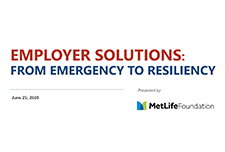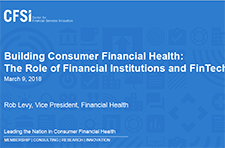Discover financial empowerment resources
Discover financial empowerment resources
Banks take fraud very seriously and have highly sophisticated security systems and teams of experts to protect you from financial fraud. As a banking customer, there are also simple steps you can take to recognize cyber crime and protect your personal information and your money. Educating yourself,...

Checking registration helps protect you from unqualified or fraudulent individuals. Always check the registration of any person or business trying to sell you an investment or give you investment advice by using the Canadian Securities Administrators’ National Registration Search. Titles like...

The DUCA Impact Lab defines fair banking as any financial product or service that lives up to the following set of principles: Pricing is clear, transparent, and well understood Pricing is representative of the cost of funds, cost of administration and risk, rather than what the market will...

This report presents the results of a Consumer Financial Protection Bureau (CFPB) funded evaluation of a Credit Builder Loan (CBL) product. CBLs are designed for consumers looking to establish a credit score or improve an existing one, while at the same time giving them a chance to build their...

This report presents results from a joint research study between the Consumer Financial Protection Bureau (CFPB) and Credit Karma. The purpose of the study is to examine how consumers’ subjective financial well-being relates to objective measures of consumers’ financial health, specifically,...

In light of COVID-19, the financial security of workers has never been more in question. The workplace is an important delivery channel for tailored financial products and services that can help meet employee’s immediate financial needs and build long-term financial stability. The workplace is a...

This report sheds light on the role employers and philanthropy can play in best promoting financial well-being for workers through the offering of Employee Financial Wellness Programs (EFWPs). Data suggests that EFWPs improve employees financial stability and help create a more productive work...

This report discusses the vulnerability of millions of people in the US who lack adequate emergency savings. A workplace-based solution—rainy day savings accounts— can potentially help workers with low savings weather financial...

This brief raises consumer perspectives on financial technology (fintech), and offers guidance for fintech developers on how to best serve low- to moderate-income...
In this video presentation Rob Levy from the Center for Financial Services Innovation (CFSI) examines the role of financial institutions in building consumer financial health. This presentation was given at the Prosper Canada Policy Research Symposium on March 9, 2018. Read the slide deck that...

This publication reveals the outcomes of Bridgable's work with a federal credit union, cutting through their overwhelming number of offerings to better engage with their low-income members. It also discusses why agility is a better bet than digitization when it comes to our changing financial...
This report provides an overview of the payday lending landscape in British Columbia compared to the rest of the country and explores the underlying factors contributing to the growth of the industry in recent years. It puts forth a series of recommendations to help ensure consumers have access to...
This brief is the joint submission of the Canadian Literacy and Learning Network (CLLN), Momentum Calgary, SEED Winnipeg, Social and Enterprise Development Innovations (SEDI), and St. Christopher House in Toronto – five non-profit organizations working to strengthen the financial inclusion and...
The Immigrant Financial Services Study combined quantitative and qualitative methods to obtain a picture of demand and supply-side barriers and opportunities for financial access for immigrants in New York City. Demand-side research consisted of three initial focus groups, a three-month survey...
The objectives for this research were to: Quantify the unbanked marketplace in New York City; Establish baseline for critical indicators of financial behaviour and household financial stability; Inform the development and targeting of financial counseling services, asset-building programs, and...
Millions of small-dollar credit borrowers are set back by predatory lending practices. There is a critical need for high-quality products designed for both borrower success and lender profitability. This report shares an analysis of practices of 16 installment lenders that have adopted some of the...
Americans rely on credit and savings to weather financial shocks and build a better future, but for the financially struggling these tools are often unavailable when they need them. To better understand the intersection between savings and credit for consumers, Visa partnered with CFSI on...
As a greater share of modern life is encoded into data streams, Big Data tools can enhance the capabilities of a wide range of financial service companies through machine-learning algorithms that get smarter over time, building stronger predictive models as they gather customers and data points....
We can educate consumers and provide access to financial products and services. But how do we help consumers use their knowledge and tools to improve their financial behaviour and become financially healthy? With six stories and thirteen project profiles, Designing for Financial Health, leverages...
For Tax Year 2002 (the latest for which IRS data is available), nearly 70 million tax filers with incomes under $30,000 received more than $82 billion in federal tax refunds – and more than 21 million filers received nearly $38 billion in the EITC.2 Total refunds in the U.S. exceed $200 billion...
Over 29 million Americans comprise the “at risk” segment – most likely of all the segments to live paycheck to paycheck and run out of money before the end of the month. Seven in ten struggle to keep on top of their bills, and a quarter are actually falling behind on credit and bill...
The Center for Financial Services Innovation is an authority on consumer financial health, leading a network of financial services innovators committed to building better consumer products and practices. The CFSI applied their four Compass Principles (Embrace inclusion, Build trust, Promote...
The Center for Financial Services Innovation (CFSI), with support from the Ford Foundation, has undertaken extensive consumer research to examine the needs, decisions, and experiences of SDC consumers, with the goal of promoting the development of high quality SDC solutions. As CFSI defines it,...
Behavioural economics is the study of how people make decisions in a complex and textured world where details matter. It draws from the fields of economics and psychology, but brings a unique perspective that departs from each of these fields in important ways. behavioural economics differs from...
